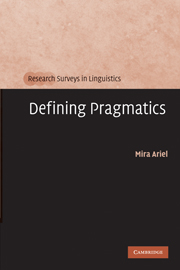Book contents
- Frontmatter
- Contents
- Preface
- Acknowledgments
- Transcription conventions
- 1 What's under the big-tent pragmatics?
- Part I Deconstructing pragmatics
- Part II Reconstituting pragmatics
- 4 Grammar as code, pragmatics as inference
- 5 Inferential pragmatic theories
- Part III Mapping the big tent
- Notes
- References
- Index of names
- Index of subjects
4 - Grammar as code, pragmatics as inference
Published online by Cambridge University Press: 05 June 2012
- Frontmatter
- Contents
- Preface
- Acknowledgments
- Transcription conventions
- 1 What's under the big-tent pragmatics?
- Part I Deconstructing pragmatics
- Part II Reconstituting pragmatics
- 4 Grammar as code, pragmatics as inference
- 5 Inferential pragmatic theories
- Part III Mapping the big tent
- Notes
- References
- Index of names
- Index of subjects
Summary
Faced with the problems discussed in Chapter 3, what did researchers do about the grammar/pragmatics divide? Some have given up on the distinction altogether. The functional grammarians for the most part do not discuss this question, but their work points to their assigning the semantics/pragmatics distinction no special significance (e.g., Heine, 1994). This is also the position of cognitive grammarians (see Langacker, 1987 and onwards). Practicing pragmatists, however, do feel a need for a practical working solution, even if it does not base pragmatics on a coherent definition (4.1). Our own resolution of the definition problem (very much in the spirit of Sperber and Wilson, 1986/1995) is to select just one criterion, the code versus inference division of labor (4.2). I then have to argue against attempts by philosophers of language to somehow rescue the assumption that linguistic semantics provides a truth-bearing proposition, leaving pragmatics with “the rest” (4.3).
A definition of convenience: pragmatics as a list of canonized topics
Especially initially, pragmatists tended to accept the role assigned to them by generative grammarians as providing a “wastebasket” for rejected semantic meanings (see Bar-Hillel, 1970; Horn, 1988): pragmatics was defined as “Meaning minus Semantics” (Gazdar, 1979; Levinson, 1983; Silverstein, 1976: 20). This formula assured a complementary division of labor between semantics and pragmatics, just because pragmatics analyzes those aspects not dealt with by semantics (and syntax). It also granted the grammarians first pick of their turf, though.
- Type
- Chapter
- Information
- Defining Pragmatics , pp. 93 - 119Publisher: Cambridge University PressPrint publication year: 2010

